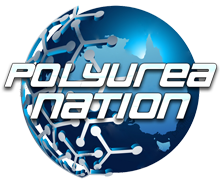Polyurea spray coating is the premier protection coating used in the sprayed-on automotive industry today. Polyurea Spray Coating provides high-quality polyurea coatments, which are created by a simple chemical reaction of only two ingredients. Once applied, these durable protective coatings resist changing environmental conditions and can safely withstand varying outdoor temperatures. There are several different polyurea coatings to choose from, each offering various levels of resistance to various types of damage and abuse. The versatility and quality of polyurea spray coating makes it one of the most sought after products in the spray coating industry.

One of the primary characteristics of polyurea coatings is their ease of application and removal. Once dry and cured, polyurea spray coating is very simple to remove with an aerosol can or paint thinner. Spray polyurea coatings are very popular in the auto and truck business because of their ability to resist oil buildup and corrosion, as well as provide smooth finishing surfaces. Many polyurea spray coatings have been found to be superior to conventional aluminum and steel materials in terms of durability and price. It is also possible to incorporate polyurea into the finish of your vehicle to improve the overall appearance of your vehicle.
Polyurea also has a wide range of applications, which includes self sealing tape, seal tapes, seal coats, crack suppressant tapes, sealants, anti-static polyurea coating, friction seal tapes, fiberglass truss sheets, and more. For many years, polyurea has been utilized for a wide range of specialized applications that require extreme weather resistance, corrosive resistance, or high impact resistance. Polyurea‘s polyurea coating provides tremendous strength and impact resistance for both indoor and outdoor applications. Due to its tremendous strength and impact resistance, polyurea coating is commonly used in the automotive, marine, and industrial sectors. In addition to polyurea coating being cost effective, it also offers a wide range of flexible features, including chemical resistance, chemical adhesion, mechanical stability, and thermal stability.
The quality and consistency of polyurea coating is highly dependent on the formulators’ preparation of the product. Formulating techniques include gas-drying, moisture-proofing, and heat-treating. Generally, before polyurea coating is formed, a polyurea spray formulation is prepared as well. The polyurea coating is cured through various methods, such as oil-drying, low-pressure spray application, and vacuum-assisted drying. While the quality and consistency of polyurea coating depends on the formulators’ preparation, formulators must comply with industry and government standards to ensure that the end result meets stringent guidelines.
Formulators must carry out a series of mixing, temperature and pressure tests, along with a series of sensory testing, before they are ready to mix their amine formulations with polyurea spray. During these tests, various sensory characteristics of the amine compounds are detected, such as texture, chemical reaction, electrical conductivity, and solubility. This sensory testing along with heat treatment is carried out by mixing the amine compounds with different pH and temperature conditions. After the amine mixture is ready, the temperature is slowly raised until a sufficient heat source is reached, at which point the amine molecules and polyurea begin a chemical reaction. The amine chemicals and polyurea react with each other through an electrochemical reaction. The end product of this reaction is a thermosetting, which hardens the polyurea coating on the surface.
The polyurea coating that hardens after heat treatment is called polyurea resistant. Most polyurea protectors, especially the polyurea spray coatings are made from a polyurea like material, which is referred to as polyurea resin. Polyureas are tough enough to resist extreme pressures and temperatures and are also resistant to oil, grease, water, and dirt. Polyureas used in roofing, flooring, insulation, and pipe sealing have high tensile strength and thermal conductivity, making them very valuable and effective products. A polyurea protected surface will be free of bubbles, cracks, and micro-scratches.

